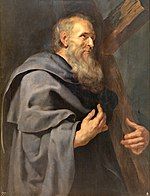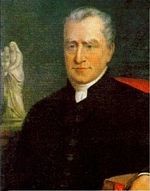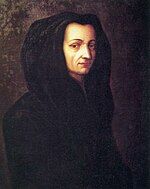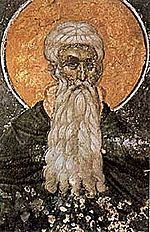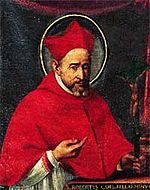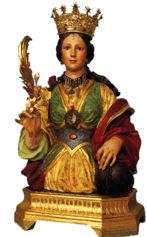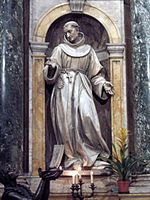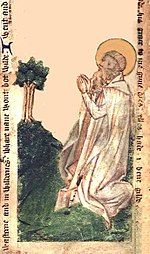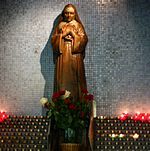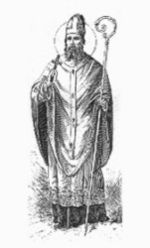Portal:Catholic Church/Patron Archive/May
Patron Archive
January - February - March - April - May - June - July - August - September - October - November - December
Today is Wednesday, December 4, 2024; it is now 04:46 UTC
James, son of Alphaeus (Greek: Ἰάκωβος, Iakōbos; Aramaic: ܝܥܩܘܒ ܒܪ ܚܠܦܝ; Hebrew: יעקב בן חלפי Ya'akov ben Halfai; Coptic: ⲓⲁⲕⲱⲃⲟⲥ ⲛⲧⲉ ⲁⲗⲫⲉⲟⲥ; Arabic: يعقوب بن حلفى, romanized: Ya'qūb bin Halfā) was one of the Twelve Apostles of Jesus, appearing under this name in all three of the Synoptic Gospels' lists of the apostles. He is generally identified with James the Less (Ancient Greek: Ἰάκωβος ὁ μικρός Iakōbos ho mikros, Mark 15:40) and commonly known by that name in church tradition. He is also labelled "the Minor", "the Little", "the Lesser", or "the Younger", according to translation. He is distinct from James, son of Zebedee and in some interpretations also from James, brother of Jesus (James the Just). He appears only four times in the New Testament, each time in a list of the twelve apostles. (Full article...)
Attributes: Carpenter's saw; fuller's club; book
Patronage: Apothecaries; druggists; dying people; Frascati, Italy; fullers; milliners; Monterotondo, Italy; pharmacists; pastry chefs; Uruguay; Luxembourg
See also: Richard Pampuri
Athanasius I of Alexandria (c. 296–298 – 2 May 373), also called Athanasius the Great, Athanasius the Confessor, or, among Coptic Christians, Athanasius the Apostolic, was a Christian theologian and the 20th pope of Alexandria (as Athanasius I). His intermittent episcopacy spanned 45 years (c. 8 June 328 – 2 May 373), of which over 17 encompassed five exiles, when he was replaced on the order of four different Roman emperors. Athanasius was a Church Father, the chief proponent of Trinitarianism against Arianism, and a noted Egyptian Christian leader of the fourth century. (Full article...)
Attributes: Bishop arguing with a pagan; bishop holding an open book; bishop standing over a defeated heretic
Patronage: -
Philip the Apostle (Greek: Φίλιππος; Aramaic: ܦܝܠܝܦܘܣ; Coptic: ⲫⲓⲗⲓⲡⲡⲟⲥ, Philippos) was one of the Twelve Apostles of Jesus according to the New Testament. Later Christian traditions describe Philip as the apostle who preached in Greece, Syria, and Asia-Minor.
In the Roman Rite, the feast day of Philip, along with that of James the Less, is traditionally observed on 1 May, the anniversary of the dedication of the church dedicated to them in Rome (now called the Church of the Twelve Apostles). In the short-lived calendar reform of 1960, it was transferred to 11 May, but since 1969 it has been assigned to 3 May. The Eastern Orthodox Church celebrates Philip's feast day on 14 November. (Full article...)
Attributes: Red Martyr, Elderly, bearded saint and open-to-God man, holding a basket of loaves and a Tau cross
Patronage: Cape Verde; Hatters; Pastry chefs; San Felipe Pueblo; Uruguay
See also: James, brother of Jesus; Stanisław Kazimierczyk
Judas Cyriacus (Cyriacus of Ancona, Cyriacus of Jerusalem, Quiriacus, Quiricus, Kyriakos); Spanish: Quirico, Italian: Ciriaco), d. ca. AD 360, is the patron saint of Ancona, Italy. His feast day is celebrated in the Catholic Church on 4 May. (Full article...)
Attributes: -
Patronage: Ancona, Italy
See also: Forty Martyrs of England and Wales; Robert Lawrence, England; Richard Reynolds, England; Augustine Webster, England; Swithun Wells, England; José María Rubio, Spain
Edmund Ignatius Rice, F.P.M., C.F.C. (Irish: Éamonn Iognáid Rís; 1 June 1762 – 29 August 1844) was a Catholic missionary and educationalist who founded two institutes of religious brothers: the Congregation of Christian Brothers and the Presentation Brothers.
Rice was born in Ireland at a time when Catholics faced oppression under Penal Laws enforced by the British authorities, though reforms began in 1778 when he was a teenager. He forged a successful career in business and, after an accident that killed his wife and left his daughter disabled and with learning difficulties, thereafter devoted his life to the education of the poor. (Full article...)
Attributes: -
Patronage: -
See also: Nunzio Sulprizio
Dominic Savio (Italian: Domenico Savio; 2 April 1842 – 9 March 1857) was an Italian student of John Bosco who became a Catholic saint. He was studying to be a priest when he became ill and died at the age of 14, possibly from pleurisy. He was noted for his piety and devotion to the Catholic faith, and was canonized a saint by Pope Pius XII in 1954. (Full article...)
Attributes: -
Patronage: choirboys, falsely accused people, juvenile delinquents
See also: François de Laval
Rose Venerini (9 February 1656 – 7 May 1728), also called Rosa Venerini, was an Italian Roman Catholic saint and virgin who founded the first public schools for girls and young women in Italy. According to the Vatican document published on the occasion of Venerini's canonization in 2006, "Wherever a new school sprang up, in a short time a moral improvement could be noted in the youth". Her confraternity of teachers, after her death, was raised to a religious congregation called the Religious Teachers Venerini (or Venerini sisters), which worked with Italian immigrants in the U.S. and Switzerland established the first day care centers in the Northeastern U.S., and worked throughout the world. Her feast day is May 7. (Full article...)
Attributes: -
Patronage: -
See also: Agostino Roscelli
Arsenius the Deacon, sometimes known as Arsenius of Scetis and Turah, Arsenius the Roman or Arsenius the Great, was a Roman imperial tutor who became an anchorite in Egypt, one of the most highly regarded of the Desert Fathers, whose teachings were greatly influential on the development of asceticism and the contemplative life.
His contemporaries so admired him as to surname him "the Great". His feast day is celebrated on May 8 in the Eastern Orthodox church, July 19 in the Roman Catholic Church, and on 13 Pashons in the Coptic Orthodox Church. (Full article...)
Attributes: -
Patronage: -
See also: Amato Ronconi
George Franco Preca, T.OCarm (in Maltese: Ġorġ Preca) (12 February 1880 – 26 July 1962) was a Maltese Catholic priest, the founder of the Society of Christian Doctrine and a Third Order Carmelite. Pope John Paul II dubbed him "Malta’s second father in faith". (Full article...)
Attributes: Priest's attire
Patronage: Malta; Swatar, Malta; Ħamrun, Malta; Society of Christian Doctrine; Catechists
See also: Pachomius the Great; Louise de Marillac, France
Father Damien or Saint Damien of Molokai SSCC or Saint Damien De Veuster (Dutch: Pater Damiaan or Heilige Damiaan van Molokai; 3 January 1840 – 15 April 1889), born Jozef De Veuster, was a Roman Catholic priest from Belgium and member of the Congregation of the Sacred Hearts of Jesus and Mary, a missionary religious institute. He was recognized for his ministry, which he led from 1873 until his death in 1889, in the Kingdom of Hawaiʻi to people with leprosy (Hansen's disease), who lived in government-mandated medical quarantine in a settlement on the Kalaupapa Peninsula of Molokaʻi. (Full article...)
Prayer: "Father of mercy, in Saint Damien you have given a shining witness of love for the poorest and most abandoned. Grant that, by his intercession, as faithful witness of the heart of your Son Jesus, we too may be servants of the most needy and rejected."
Attributes: -
Patronage: People with leprosy
See also: John of Ávila, Spain
Gangulphus of Burgundy (died 11 May 760 AD) is venerated as a martyr by the Catholic Church. Gangulphus was a Burgundian courtier whose historical existence can only be attested by a single document: a deed from the court of Pepin the Short dated 762. It attests that he was a great landowner, whose family dominated the region and exercised a lot of power.
Gangulphus decided to renounce his wealth and become a hermit. Even so, he was subsequently killed by his wife's lover, who wished to remove Gangulphus as a possible interference to the adulterous relationship. (Full article...)
Attributes: Pictured as a Burgundian knight with a fountain springing under his sword. He holds a shield with a cross. He may also hold the spear with which he was murdered.
Patronage: Saint of husbands unhappily married; tanners, shoemakers, children, and horses; invoked against knee pains, sicknesses affecting the eyes and skin; invoked against marital difficulties and adultery
See also: Ignatius of Laconi; Frei Galvão, Brazil
Pancras (Latin: Sanctus Pancratius) was a Roman citizen who converted to Christianity and was beheaded for his faith at the age of fourteen, around the year 304. His name is Greek (Πανκράτιος Pankrátios), meaning 'all-powerful'.
From an early period, Pancras was venerated together with Nereus and Achilleus in a shared feast day and Mass formula on 12 May. In 1595, 25 years after Pope Pius V promulgated the Tridentine Missal, Domitilla was also added.
Since 1969, Pancras has been venerated separately, still on 12 May. He is traditionally the second of the Ice Saints. In the Syriac traditions he is known as Mor Izozoel (Mar Azazael), remembered on 12 May and 12 August. He is the patron saint of children. (Full article...)
Attributes: Roman legion armour, martyr's palm branch, book, quill, sword
Patronage: -
See also: Saints Nereus and Achilleus; Leopold Mandić, Croatia
Robert Bellarmine SJ (Italian: Roberto Francesco Romolo Bellarmino; 4 October 1542 – 17 September 1621) was an Italian Jesuit and a cardinal of the Catholic Church. He was canonized a saint in 1930 and named Doctor of the Church, one of only 37. He was one of the most important figures in the Counter-Reformation. (Full article...)
Attributes: -
Patronage: Bellarmine University; Bellarmine Preparatory School; Fairfield University; Bellarmine College Preparatory; St. Robert's School, Darjeeling; canonists; canon lawyers; catechists; Robert Barron (bishop); catechumens; Archdiocese of Cincinnati
See also: Julian of Norwich; John the Silent; Gerard of Villamagna; André-Hubert Fournet; Julie Billiart; Maria Domenica Mazzarello
Matthias (/məˈθaɪəs/; Koine Greek: Ματθίας, Matthías [maθˈθi.as], from Hebrew מַתִּתְיָהוּ Mattiṯyāhū; Coptic: ⲙⲁⲑⲓⲁⲥ; died c. AD 80) was, according to the Acts of the Apostles, chosen by God through the apostles to replace Judas Iscariot following the latter's betrayal of Jesus and his subsequent death. His calling as an apostle is unique, in that his appointment was not made personally by Jesus (who had already ascended into heaven), and it came before the descent of the Holy Spirit upon the early Church. (Full article...)
Attributes: axe, Christian martyrdom
Patronage: alcoholics; carpenters; tailors; Gary, Indiana; Great Falls-Billings, Montana; smallpox; hope; perseverance
See also: Michel Garicoïts, France; Théodore Guérin
Isidore the Laborer, also known as Isidore the Farmer (Spanish: San Isidro Labrador) (c. 1070 – 15 May 1130), was a Mozarab farmworker who lived in medieval Madrid. Known for his piety toward the poor and animals, he is venerated as a Catholic patron saint of farmers, and of Madrid; El Gobernador, Jalisco; La Ceiba, Honduras; and of Tocoa, Honduras. His feast day is celebrated on 15 May. (Full article...)
Prayer: "Dear Saint Isidore, you know how normal it is to cultivate the land for you were employed as a farm laborer most of your life. Although you received God's help materially through Angels in the field, all farmers are aided spiritually to see the wonders God has strewn on this earth. Encourage all farmers in their labours and help them to feed many people. Amen."
Attributes: Portrayed as a peasant holding a sickle and a sheaf of corn, a sickle and staff; as an angel plows for him; or with an angel and white oxen near him. In Spanish art, his emblems are a spade or a plough.
Patronage: Madrid; agriculture; farmers; day labourers; • Argentina–San Isidro; • Chile–Cuz Cuz; • Peru–Carampa, Lima; • The Philippines–numerous locations; • Puerto Rico–Sabana Grande; • Spain–Castalla, Estepona, Madrid, Orotava, Valdepiélagos; • Honduras–La Ceiba
See also: Jeanne de Lestonnac, France
Brendan may refer to: (Full article...)
Attributes: whale; priest celebrating Mass on board a ship while fish gather to listen; one of a group of monks in a small boat
Patronage: boatmen; divers; mariners; sailors; travellers; whales; portaging canoes; Diocese of Clonfert; Diocese of Kerry
See also:Abdas of Susa; Andrew Bobola, Poland
Restituta (Restituta of Africa; died in AD 255 or 304) is a Berber saint and martyr of the Roman Catholic and Eastern Orthodox Churches. She was said to have been born in Carthage or Teniza (presently Ras Djebel, Tunisia) and martyred under Roman Emperor Diocletian. The location and date of her martyrdom are not precisely known. She sometimes is considered one of the Martyrs of Abitinae, Roman Province of Africa, a group of North Africans including Dativus, Saturninus, et alia, who were martyred in AD 304. (Full article...)
Attributes: -
Patronage: Lacco Ameno
See also: Giulia Salzano
Venantius of Camerino (Italian: San Venanzio, also known as Saint Wigand) (died 18 May 251 or 253) is the patron saint of Camerino, Italy and Raiano, Italy. Christian tradition holds that he was a 15-year-old who was tortured, and martyred by decapitation at Camerino during the persecutions of Decius. Martyred with him were 10 other Christians, including the priest Porphyrius, Venantius' tutor; and Leontius, bishop of Camerino. (Full article...)
Attributes: Young man crucified upside-down with smoke coming from his head; young man holding the citadel of Camerino; young man holding the city of Camerino, a palm, and a book; young man with a banner holding a city wall
Patronage: Camerino and Raiano (AQ)
See also: Pope John I
Dunstan (c. 909 – 19 May 988), was an English bishop and Benedictine monk. He was successively Abbot of Glastonbury Abbey, Bishop of Worcester, Bishop of London and Archbishop of Canterbury, later canonised. His work restored monastic life in England and reformed the English Church. His 11th-century biographer Osbern, himself an artist and scribe, states that Dunstan was skilled in "making a picture and forming letters", as were other clergy of his age who reached senior rank. (Full article...)
Attributes: Man holding a pair of smith's tongs; with a dove hovering near him; with a troop of angels before him
Patronage: Blacksmiths; Charlottetown, Canada; goldsmiths; locksmiths; musicians; silversmiths; bellringers
See also: Theophilus of Corte; Crispin of Viterbo; Maria Bernarda Bütler; Francisco Coll Guitart, Spain
Bernardino of Siena, OFM (Bernardine or Bernadine; 8 September 1380 – 20 May 1444), was an Italian Catholic priest and Franciscan missionary preacher in Italy. He was a systematizer of scholastic economics. (Full article...)
Attributes: Tablet with IHS; three mitres representing the bishoprics which he refused
Patronage: Advertisers; advertising; Aquila, Italy; chest problems; Italy; Diocese of San Bernardino, California; gambling addicts; public relations personnel; public relations work; Bernalda, Italy
Godric of Finchale (or St Goderic) (c. 1065-1070 – 21 May 1170) was an English hermit, merchant and popular medieval saint, although he was never formally canonised. He was born in Walpole in Norfolk and died in Finchale in County Durham.
Some of the earliest surviving English songs have been attributed to him. (Full article...)
Attributes: Hermit
Patronage: -
See also: Eugène de Mazenod, France; Arcangelo Tadini; Pietro Parenzo; Cristóbal Magallanes Jara, Mexico; Mateo Correa Magallanes, Mexico; Saints of the Cristero War
Rita of Cascia, OSA (born Margherita Ferri Lotti; 1381 – 22 May 1457), was an Italian widow and Augustinian nun. After Rita's husband died, she joined a small community of nuns, who later became Augustinians, where she was known both for practicing mortification of the flesh and for the efficacy of her prayers. Various miracles are attributed to her intercession, and she is often portrayed with a bleeding wound on her forehead, which is understood to indicate a partial stigmata.
Pope Leo XIII canonized Rita on 24 May 1900. Her feast day is celebrated on 22 May. At her canonization ceremony, she was bestowed the title of "Patroness of Impossible Causes," while in many Catholic countries, Rita came to be known as the patroness of abused wives and heartbroken women. Her bodily remains lie in the Basilica of Santa Rita da Cascia. (Full article...)
Attributes: Forehead wound, rose, bees, grape vine
Patronage: Lost and impossible causes, sickness, wounds, marital problems, abuse, mothers
Saint William of Perth (died c. 1201), also known as Saint William of Rochester or Saint Liam was a Scottish saint who was martyred in England. He is the patron saint of adopted children. Following his death, he gained local acclaim and was canonised by Pope Alexander IV in 1256.
William was a devout individual and a baker who gave every tenth loaf of bread to the poor. He adopted an abandoned child and taught him his trade. Years later they set off on a pilgrimage. William was murdered, and his adopted son suspected of the crime intending to rob him. The Bishop of Rochester obtained William's canonization and created a shrine in Rochester Cathedral which drew many pilgrims. (Full article...)
Attributes: Walking staff, palmer's wallet, little dog
Patronage: Adopted children
See also: Michael of Synnada; Giovanni Battista de' Rossi
Manahen /ˈmæniən/ (also Manaen or Menachem) was a teacher in the first century Christian Church at Antioch who had been 'brought up' (Greek: σύντροφος, syntrophos, Vulgate: collactaneus) with Herod Antipas.
According to the Acts of the Apostles, he was among those who sent Paul and Barnabas on their first missionary journey. He was probably one of the founders of the church at Antioch. (Full article...)
Attributes: Praying and fasting
Patronage: Syria
See also: Vincent of Lérins; Hermann Joseph, Germany
Bede (/biːd/; Old English: Bēda [ˈbeːdɑ]; 672/3 – 26 May 735), also known as Saint Bede, the Venerable Bede, and Bede the Venerable (Latin: Beda Venerabilis), was an English monk, author and scholar. He was one of the greatest teachers and writers during the Early Middle Ages, and his most famous work, Ecclesiastical History of the English People, gained him the title "The Father of English History". He served at the monastery of St Peter and its companion monastery of St Paul in the Kingdom of Northumbria of the Angles.
Born on lands belonging to the twin monastery of Monkwearmouth–Jarrow in present-day Tyne and Wear, England, Bede was sent to Monkwearmouth at the age of seven and later joined Abbot Ceolfrith at Jarrow. Both of them survived a plague that struck in 686 and killed the majority of the population there. While Bede spent most of his life in the monastery, he travelled to several abbeys and monasteries across the British Isles, even visiting the archbishop of York and King Ceolwulf of Northumbria. (Full article...)
Attributes: The Historia ecclesiastica gentis Anglorum, a plume, a biretta
Patronage: English writers and historians; Jarrow, Tyne and Wear, England, San Beda University, San Beda College Alabang
See also: Pope Gregory VII; Mary Magdalene de' Pazzi; Madeleine Sophie Barat, France
Philip Romolo Neri CO (/ˈnɪəri/ NEER-ee; Italian: Filippo Romolo Neri, pronounced [fiˈlippo ˈrɔːmolo ˈneːri]; 22 July 1515 – 26 May 1595), sometimes referred to as the Second Apostle of Rome after Saint Peter, was an Italian Catholic priest who founded the Congregation of the Oratory, a society of secular clergy dedicated to pastoral care and charitable work. Neri's spiritual mission emphasized personal holiness and direct service to others, particularly through the education of young people and care for the poor and sick. His work played a significant role in the Counter-Reformation, especially within the city of Rome.
Neri's early life in Florence and later move to Rome in 1533 marked the beginning of his dedication to missionary work. He initially gained prominence for his pastoral care and efforts to minister to marginalized communities, including prostitutes and the destitute. His passion for reform and personal holiness drew many followers, leading to the formation of the Church of the Most Holy Trinity of the Pilgrims and the Congregation of the Oratory. The Oratory became a center of spiritual renewal and pastoral innovation, focusing on prayer, music, and informal spiritual gatherings that combined religious instruction with personal reflection. (Full article...)
Attributes: -
Patronage: Rome, Candida (Italy), Mandaluyong, US Special Forces, Institute of Christ the King Sovereign Priest, Piczon Vill, Catbalogan, laughter, humour, joy
See also: Quadratus of Athens; Mariana de Jesús de Paredes, Ecuador
Augustine of Canterbury (early 6th century – most likely 26 May 604) was a Christian monk who became the first archbishop of Canterbury in the year 597. He is considered the "Apostle to the English".
Augustine was the prior of a monastery in Rome when Pope Gregory the Great chose him in 595 to lead a mission, usually known as the Gregorian mission, to Britain to Christianize King Æthelberht and his Kingdom of Kent from Anglo-Saxon paganism. Kent was likely chosen because Æthelberht commanded major influence over neighbouring Anglo-Saxon kingdoms in addition to his marriage to Bertha, a Frankish princess, who was expected to exert some influence over her husband. Before reaching Kent, the missionaries had considered turning back, but Gregory urged them on, and in 597, Augustine landed on the Isle of Thanet and proceeded to Æthelberht's main town of Canterbury. (Full article...)
Attributes: -
Patronage: -
Saint Bernard of Menthon or Bernard of Aosta was a Burgundian Catholic priest and founder of the Great St Bernard Hospice, as well as its associated Canons Regular of the Hospitaller Congregation of Great Saint Bernard. (Full article...)
Attributes: In the mountains, with a dog
Patronage: mountaineers, skiing, snowboarding, backpacking and the Alps
Pope Paul VI (Latin: Paulus VI; Italian: Paolo VI; born Giovanni Battista Enrico Antonio Maria Montini, Italian: [dʒoˈvanni batˈtista enˈriːko anˈtɔːnjo maˈriːa monˈtiːni]; 26 September 1897 – 6 August 1978) was head of the Catholic Church and sovereign of the Vatican City State from 21 June 1963 to his death on 6 August 1978. Succeeding John XXIII, he continued the Second Vatican Council, which he closed in 1965, implementing its numerous reforms. He fostered improved ecumenical relations with Eastern Orthodox and Protestant churches, which resulted in many historic meetings and agreements. In January 1964, he flew to Jordan, the first time a reigning pontiff had left Italy in more than a century. (Full article...)
Attributes: Papal vestments, Papal tiara
Patronage: Archdiocese of Milan; Paul VI Pontifical Institute; Second Vatican Council; Diocese of Brescia; Concesio; Magenta; Paderno Dugnano
See also: Maximin of Trier; Ursula Ledóchowska, Poland
Joan of Arc (French: Jeanne d'Arc [ʒan daʁk]; Middle French: Jehanne Darc [ʒəˈãnə ˈdark]; c. 1412 – 30 May 1431) is a patron saint of France, honored as a defender of the French nation for her role in the siege of Orléans and her insistence on the coronation of Charles VII of France during the Hundred Years' War. Claiming to be acting under divine guidance, she became a military leader who transcended gender roles and gained recognition as a savior of France. (Full article...)
Attributes: Armor, banner, sword
Patronage: France; martyrs; captives; military personnel; people ridiculed for their piety; prisoners; soldiers; women who have served in the WAVES (Women Accepted for Volunteer Emergency Service); and Women's Army Corps
See also: Gavinus; Luke Kirby, England; Joseph Marello
Petronilla (Aurelia Petronilla) is an early Christian saint. She is venerated as a virgin by the Catholic Church. She died in Rome at the end of the 1st century, or possibly in the 3rd century. (Full article...)
Attributes: Depicted being healed by Saint Peter the Apostle; early Christian maiden with a broom; lying dead but incorrupt in her coffin with flowers in her hair as the coffin is opened during renovations; receiving the newly dead into heaven; set of keys; spurning a marriage proposal, represented by a ring, being offered by a king; standing with Saint Peter; woman holding a set of keys; woman with a dolphin
Patronage: The dauphins of France; mountain travellers; treaties between Popes and Frankish emperors; invoked against fever
See also: Camilla Battista da Varano



